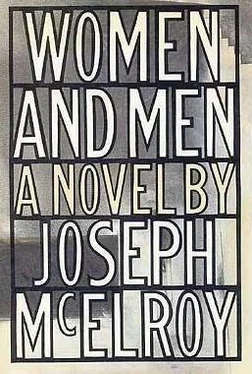Yes? came a fourth voice after him, a male voice, Yes? — money in the basement —incredible — unheard of! — and it might have been a brother voice speckled with electronic shivers in transmission and pressing him from an emptiness — a what? — but what fourth voice, when here he had with him only Joy and her friend Lucille, suddenly her friend, and he knew it hadn’t been like that always, not in ‘64, Lucille’s year of the young cop Rick ("Don’t let me hear you call cops ‘pigs,’ darling!") nor ‘65, Joy’s year of Wagner and the year of that awful scuffle leaving Wagner on his own floor with nose and neck deflected left and right respectively, but Wagner’s trouble or pain distinctly greater than his assailant’s jealousy, which in its lessening was a new unknown.
— but a fixed trellis up the side of the house must not become a movable ladder, said the semi-retired assailant, how do you like that? how’m I doing?
You’re crazy, said Lucille, that’s how you’re doing. It was men, it was a men’s promotion, said Lucille (who had once been heard to say, like a quietly embarrassing bad joke, that she preferred to be with men once).
But what if the Lindbergh kid had been a girl, then? said Mayn.
Men even more, said Lucille at once.
Innocent women and children, said Joy between them.
They’ll say "my son and heir," said Lucille, but never "my daughter and heiress," and even if they thought those words, they’d mean her honor, they’d mean the money that laying her would bring.
A gap occurred, he was sure, and as if he were being commented on beyond him, it was a model invitation to him to be not here, or he was the head of a slain enemy now honored with best tidbits stuffed into its mouth, insert an honorary cigar and a word or two — and if the gap or void was different from him, it still gave off a scent of almond, nature’s unsalted, unskinned almond, sweet wood (familiar but thinned past something or other, the grain, the tongue-dissolving grain or meat of the actual nut) — was it Joy’s shampoo? and was that tongue of his her tongue, that dissolved the way crazy people thought they had someone else’s limb, say? And he looked at her hair all around her eyes while she and Lucille looked at him.
And together with this almond essence (bathroom cabinet) occurred a creamy-salve slipperiness to his mind, yes — well this is getting pretty hairy, pretty sensitive — and this slipperiness (damn it) was being where no traction was, but none only if he tried to find it, tried to move. And an impression passed through his lostness that friends Joy and her confident (confidant— conf\daunt!) Lucille would like him to go back where he came from though in the wordless interim Joy seemed to (damn it) say to him: You never wound up the Morgan story, the man in western New York? (oh yeah) who in the middle 1820s had threatened to tell certain local secrets of the greatest secret society in the Western World, the Masons — are there Tibetan Masons, aboriginal, arctic? — and one day was charged and jailed in Canandaigua and still more dubiously allowed the next day to disappear with the help of an abductor pretending to be his friend (I did finish it, I just didn’t fill it out) (or, said Joy, connect it to anything else like the price of eggs or—), his friend whose identity and connection with a famous resident of Washington was learned by a village lawyer’s daughter from her secret lover, a plump journeyman printer, who vanished from Canandaigua taking with him only his secret, the tools of his trade, and the heart of the attorney’s daughter, and reappeared in the employ of a Socialist Free Press run by a workingmen’s party in Philadelphia: there the village attorney’s daughter joined him, was pursued all the way from western New York by her lean and wheezing father, a prominent Mason, and through an agent of the great man met Jackson himself in New York City where that yellow-skinned gaseous and indigestible smoked Hickory fell in love with her, for herself or for her secrets none knew except, apparently, the father or uncle of that very Hermit-Inventor of New York City who helped Mayn’s own grandmother Margaret when she came home from the West in 1893 or ‘94.
That is, that is. . Joy only seemed to say to him, Tell us how Andrew Jackson defended women and children against the childlike Indians he thought he was the father of—
and how (Mayn continued) the woods were full of insane survivors missing the tops of their heads which had held each its own Manitou or private god dreamed in bird or snake form, say, and these were being collected to make a new common denomination of mutual god. And Mayn asked himself off the top of his head, Why do I tell these stories as if they were finished? (He heard his little daughter start to sing in the next room.)
But Joy had not spoken out loud.
Joy ran a hand through her hair and looked as dumb as her husband had felt, but she’d gone pale in honor of his picking up a piece of her thought, her picture, his scalped lunatics, her bumpy debumped scab heads, his Jackson, her Andrew, their woods, woods owned mutually, like the dreaded Red Sticks, the Creeks, the Cherokees, what have you? more hatcheted than hung, tradition had it — and in which woods were to be found the Choctaws who gave slain enemies a month of mourning to make friends of them. But Joy and Lucille could not hold out and their eyes met and they shook their heads at his whimsy, which, like the message the blindly obedient messenger unexpectedly opens to see for himself, turned out to be a remark that he hadn’t foreseen and that seemed smarter than he was, while — wait—
But he wasn’t there (was he?) — since that was future. So Joy’s absence was not either.
Which accounted for why right now (right here and now) he could jolly her gently, here and now in a kitchen with Lucille: "Flick’s no heiress but thank God she has Joy’s looks" — Lucille ignored him—"and brains" — the three of them hearing also the words that traditionally occupied the space of "brains" understood to be Joy’s — but what the hell, only a saying, and men can’t equal women — all in all he didn’t have to cope with this new tedious intelligence thrust around him by circumstance in order to accept their— their — all-around strength. They were agreeing, Joy and Lucille; agreeing— there in a kitchen more or less with him and as, suddenly, the mid-sixties looked up at him like a mere substitute for the late sixties — agreeing with some nodding of heads, Joy’s dark, Lucille’s gray-blond, with papery craters under her eyes enlarging their blue more than showing as her full cheeks and wide mouth worn and used and powerfully impressed by its own thought and coming-on-to somebody to move and to kiss (he felt — he felt her final contempt) — they were agreeing, Lucille and Joy, that you was never safe from relapse, the words you said always carried other words underneath them that said it isn’t really you making the demands; no, be your gentle self, kid, be cool, that’s a way to yield, and later tonight or tomorrow you’ll get him to give in and stop the check with which you paid the black (chauvinist) electrician who left one dimmer switch so it won’t hold the brightest notch, or 'That’s a relapse?" said Mayn, crinkling his grin, Lucille looked so steadily at Joy, while she recreated a mid-marital reveille the gist of which was her arm, "my big soft arm," slamming over onto her husband’s sleeping face—"Oh I did that once," said Joy, quite happily and Flick never got quite into her mother’s head at these times "of" Lucille, so what Joy felt or agreed etcetera, was kind of clear but only kind of — at an instant when Frank had claimed to be dreaming of a good fuck that cleared the air whereupon he opened his eyes into the inner spaces of Lucille’s arm, got out from under, dripped blood out of his nose onto the sheet and was so angry, not yet awake, that he cocked his leg and kicked her out of bed the way you break down a door.
Читать дальше












